 We are happy to share with you our newly released ECE Annual Report 2016. A look back at our past year highlights research activities by Profs. Bo Chen, Durdu Guney, Saeid Nooshabadi, Sumit Paudyal, and Reza Zekavat; along with Paul Bergstrom’s Faculty Fellow Program appointment and an interview with HKN’s Professor of the Year, Kit Cischke. Staff profile this edition is Michele Kamppinen, honored in May for her 25 years of service to the University. Our graduate student story features recent PhD, Jennifer (Jenn) Winikus, who made great contributions in STEM outreach during her time at Michigan Tech. Once again the year included a wide variety of hands-on student projects in our Senior Design and Enterprise programs and we thank our sponsors for making it all possible! We invite you to read about these stories and more. From all of us at ECE, best wishes for 2017!
We are happy to share with you our newly released ECE Annual Report 2016. A look back at our past year highlights research activities by Profs. Bo Chen, Durdu Guney, Saeid Nooshabadi, Sumit Paudyal, and Reza Zekavat; along with Paul Bergstrom’s Faculty Fellow Program appointment and an interview with HKN’s Professor of the Year, Kit Cischke. Staff profile this edition is Michele Kamppinen, honored in May for her 25 years of service to the University. Our graduate student story features recent PhD, Jennifer (Jenn) Winikus, who made great contributions in STEM outreach during her time at Michigan Tech. Once again the year included a wide variety of hands-on student projects in our Senior Design and Enterprise programs and we thank our sponsors for making it all possible! We invite you to read about these stories and more. From all of us at ECE, best wishes for 2017!
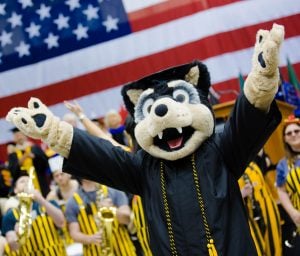 It’s a great day to be a Husky!
It’s a great day to be a Husky!
Today is the last day of final exams for the Fall 2016 semester; tomorrow we will hold our fall commencement exercises in the Student Development Complex. At Michigan Tech we hold commencement twice a year, once in December and once at the end of the spring semester. It’s convenient for the students graduating in December, about one third of the students graduating each year. Splitting into two ceremonies makes it possible for us to read the names of every graduate getting a diploma as they cross the stage, without being there all day. It’s hard not to feel a little emotional during these rituals, as we see the culmination of a lot of hard work on the part of the students and the faculty. It’s a big moment for all the parents in attendance, to be sure, but as surrogate parents for these young men and women over the past 4-5 years it’s a big moment for us too.
I always enjoy talking to the graduates as we stand in line waiting to enter the gym. I typically ask the same two questions: what was your favorite course or instructor, and what are you doing after graduation? On the first question, I have come to anticipate the answer, knowing that we have a handful of instructors in the ECE Department that consistently go above and beyond in carrying out their teaching responsibilities. Every once in a while I am very pleasantly surprised to hear a name I have not heard before, to learn that someone is growing as a teacher and is reaching out to students in new and different ways. The second question is always fun, as I know that all of our ECE graduates who have been seeking jobs will have one. Michigan Tech performs very well in college rankings that emphasize “return on investment.” That is a reflection of everything we do here, both in our rigorous academic programs and through all the support activity from Career Services and Student Affairs. One of the stories creating some buzz around the department this year is that one of our BS graduates received and accepted a job offer with a six-figure salary – not in California, either, but right here in Michigan! I know it’s not all about the money, but I do believe that the value of a Michigan Tech education, both to the students and to prospective employers, is something to be proud of.
All of this hoopla is taking place against a backdrop of a sudden change in the weather. Some readers may recall my writing (OK, whining) in recent columns about the late and warm fall we have had this year. Well, no more. With a shift in the weather patterns, we are getting cold arctic air blowing from the northwest across Lake Superior and churning up the lake effect snow machine, big time. According the Keweenaw Research Center out by the airport, the one measurement I trust, we have had 41 inches of snow in December as of noon Wednesday. Much of this past week we were under a blizzard warning, and in a lapse of good judgment I happened to be out on one of our local highways Tuesday morning in the worst white-out conditions I have experienced since moving to Houghton. (I made it home safe and sound, thank you very much.) The cross-country ski trails opened up quickly and are good to go. To my astonishment, I learned that Mont Ripley, Michigan Tech’s own ski hill right here in town, opens today. Guess where I’m going to be Saturday right after commencement!
– Dan
Daniel R. Fuhrmann
Dave House Professor and Chair
Department of Electrical and Computer Engineering
Michigan Technological University
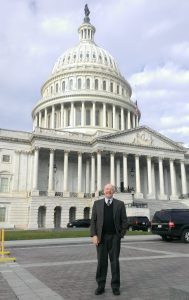 This week I had the opportunity to join Wayne Pennington, our Dean of the College of Engineering, and Brent Burns, the Director of Federal and Industry Relations, on a two-day trip to Washington, D.C. The purpose was to meet some of our congressional delegations and to host an alumni event for Huskies in the DC area. I do not have a lot of experience in government relations as it relates to my role as department chair, but I should probably be doing more of that and so the trip was valuable and educational for me.
This week I had the opportunity to join Wayne Pennington, our Dean of the College of Engineering, and Brent Burns, the Director of Federal and Industry Relations, on a two-day trip to Washington, D.C. The purpose was to meet some of our congressional delegations and to host an alumni event for Huskies in the DC area. I do not have a lot of experience in government relations as it relates to my role as department chair, but I should probably be doing more of that and so the trip was valuable and educational for me.
I came away with a number of different impressions. First, the city of Washington itself seems alive and well. The iconic landmarks themselves – the Capitol building, the White House, the Washington Monument, the Lincoln Memorial, all the museums, and much more – are really quite beautiful, and it is hard to be down on the mall without feeling a strong sense of national pride. Despite all the bickering and acrimony we have seen this year, the work of government is really very important and I am glad that our Nation’s capital stands as a beacon for the rest of the world, a stately setting for democracy in action. Beyond the mall the city seems to be thriving economically and culturally, which is a positive change over the years that I have visited. It is an energizing place just to walk around.
The political mood of the people I met was not as polarized as I expected. I think everyone, no matter their political persuasion, agrees that there are going to be some changes with the incoming administration, but most have no idea what to expect. If there is one thing we can probably all agree on, it is that Donald Trump is unpredictable. So, there is a lot of curiosity not necessarily anxiety. It’s more like they are waiting for the show to start and expecting to be entertained. Of course, everyone we were talking to is intelligent, well-educated, and ambitious, so they are likely to land on their feet no matter what happens. I suspect there is a lot more anxiety out on the margins of society.
I was struck by how youthful everyone was, except for the senators and representatives themselves. Let’s face it, Washington in a young person’s town. They find positions in the various administrations as staffers and aides, work like crazy 24/7 until they burn out, and then move on. I guess that’s not a bad thing. As I said above, the work of government is important, and there is value in having smart, energetic young people doing all the day-to-day work you never hear about. It did make me feel old though.
We wrapped up Wednesday evening by attending an all-Michigan holiday party in a beautifully decorated space in one of the congressional office buildings. It was attended by senators, representatives, lots of the aforementioned young staffers, Michigan businesses with offices in D.C., and university representatives including us. There was plenty of opportunity for networking, and an abundance of wonderful food and drink. On the dessert table they had, among many other goodies, some cute little Michigan cookies – see adjacent photo. Question: what’s wrong with this picture?
Question: what’s wrong with this picture?
– Dan
Daniel R. Fuhrmann, Dave House Professor and Chair
Department of Electrical and Computer Engineering
Michigan Technological University
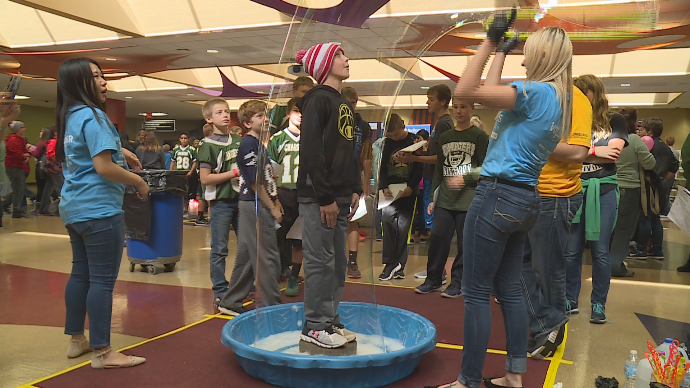 Here we are at the first of December, when thoughts turn to final exams, mid-year commencement, holiday parties (lots of holiday parties) and the winter break. Usually this time of year brings plenty of snow, but not so this year. We have had one of the warmest, driest falls on record, and we are just now starting to get a snow covering that looks like it might stick around for a while. A few more days of this, though, and folks (including me) will be ready to start cross-country skiing. It doesn’t take much. Mont Ripley, Michigan’s downhill ski area, is another story. Last year they opened on Christmas, which was pretty late, and I’m not even sure they are going to make that this year. We have a lot of snow to make up if we are going to hit the Farmer’s Almanac predictions for this year!
Here we are at the first of December, when thoughts turn to final exams, mid-year commencement, holiday parties (lots of holiday parties) and the winter break. Usually this time of year brings plenty of snow, but not so this year. We have had one of the warmest, driest falls on record, and we are just now starting to get a snow covering that looks like it might stick around for a while. A few more days of this, though, and folks (including me) will be ready to start cross-country skiing. It doesn’t take much. Mont Ripley, Michigan’s downhill ski area, is another story. Last year they opened on Christmas, which was pretty late, and I’m not even sure they are going to make that this year. We have a lot of snow to make up if we are going to hit the Farmer’s Almanac predictions for this year!
It takes a great deal of people and organizations, all across the university, to offer a successful educational program in electrical and computer engineering. This week I thought I would give a special mention to Michigan Tech’s Center for Pre-College Outreach. This is the group that is responsible for making sure that we get the message out to middle school and high school students, sometimes even younger, about the excitement and the opportunities in STEM fields. Part of the mission is recruiting for Michigan Tech, to be sure, but there is also a component which provides a tremendous service by getting kids excited about science and technology, no matter where they end up going to college. The Center is run by Cody Kangas; from everything I have seen, Cody and his team are doing a fantastic job.
One of the main events in the Center’s portfolio is something called Mind Trekkers. This is Michigan Tech’s “road show” in which student volunteers go out and fill up large spaces, indoor and outdoor, with experiment and demonstrations designed to get kids excited and have fun. The demos include blowing things up in trash cans, making weird goop with corn starch, freezing balloons with liquid nitrogen, making art with magnets and iron filings, that sort of thing. I was aware of the program and had seen some presentations about it, but I never really understand the scale of one of these Mind Trekker events until I attended one about a month ago at Schoolcraft College, in Livonia, Michigan, as part of a longer trip to southeast Michigan. This was really an eye-opener for me. Schoolcraft is a good-sized community college in the suburban Detroit area, and they were kind enough to open up a large indoor event center, large outdoor area with a tent, and multiple smaller indoor spaces for this event. This one was specifically targeted at middle school students, and there were about 2000 kids bused in from all over the area. I walked around, watched the demos, and picked up on the incredible energy from that of many pre-teens. I was very pleasantly surprised to see many ECE students among the volunteers, and made a special effort to thank all of them for being there. It really gave me new-found respect for all the hard work being done in student-focused areas of the university outside the academic departments.
Another very successful program run out of the Center for Pre-College Outreach is the Summer Youth Programs (SYP). These are programs that bring middle school and high school students to the Michigan Tech campus for a week, sort of like summer camp, and get them engaged in a variety of technical activities. Here we can do things that look a little more like real engineering. The ECE Department participates actively in SYP, due in large part to the hard work of Dr. Glen Archer, Principal Lecturer and Associate Chair of the department. We have also been fortunate for the past several years to have ECE PhD student Jennifer Winikus organizing and delivering a lot of the ECE summer youth classes. Jenn just completed her PhD, and has moved on to a teaching position at the University of Buffalo. I am pretty certain her summer youth experience, as well as her experience as a teaching assistant in our regular undergraduate teaching laboratories, will serve her well in her new position. In addition to his work with summer youth, Glen Archer serves as the faculty mentor for the both the Blue Marble Security Enterprise and the Robotic Systems Enterprise, and he has organized outreach teams in both. Glen is passionate about spreading the word about electrical and computer engineering, and getting our students involved in doing the same. We are lucky to have him – he brings a lot of positive energy to the department.
Hats off and Happy Holidays to all who work on behalf of our current and future Huskies!
– Dan
Daniel R. Fuhrmann, Dave House Professor and Chair
Department of Electrical and Computer Engineering
Michigan Technological University
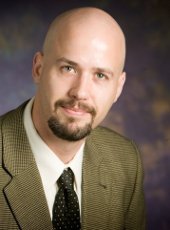
Wayne Weaver (ECE/AIM) is the principal investigator on a project that has received a $46,000 research and development contract from Sandia National Laboratories.
The title of the project is “Meta-Stability of Pulsed Load Microgrids.” This is a six and a half month project.
By Sponsored Programs.
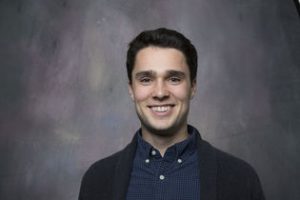
Three Michigan Tech students are among 169 students from 49 higher education institutions worldwide to be named University Innovation Fellows. They are: Rachel Kolb (MEEM), Kyle Ludwig (ECE), and Adam Weber (CNSA).
The University Innovation Fellows program empowers students to become agents of change at their schools. Fellows work to ensure that their peers gain the knowledge, skills and attitudes required to compete in the economy of the future and make a positive impact on the world. To accomplish this, the Fellows advocate for lasting institutional change and create opportunities for students to engage with innovation, entrepreneurship, design thinking and creativity at their schools.
Fellows design innovation spaces, start entrepreneurship organizations, host experiential learning events and work with faculty to develop new courses.
The program is run by Stanford University’s Hasso Plattner Institute of Design. With the addition of the new Fellows, the program has trained 776 students at 164 institutions since its creation.
Ludwig, a computer engineering major from Traverse City, Michigan is involved in Michigan Tech’s Entrepreneurs Club, the Electrical and Computer Engineering Undergraduate Advisory Board, and the Pavlis Honor’s College. Ludwig would like to use his education in computer engineering, along with his passion for health and fitness, to improve health using technology.
“We believe that students can be so much more than just the customers of their education. They can be leaders of change and they can co-design the higher education experience,” said Humera Fasihuddin, co-director of the University Innovation Fellows program.
“This core belief has driven the program since its inception, and we’ve seen the results of this belief put to action at schools around the world. Fellows are collaborating with their peers, faculty and administrators to create more educational opportunities for students at their schools. They are making measurable gains, both in the number of resources and the students served by the innovation and entrepreneurship ecosystem.”
Individual Fellows as well as institutional teams of Fellows are sponsored by faculty and administrators and selected through an application process twice annually.
Throughout the year, they take part in events and conferences and have opportunities to learn from one another, Stanford mentors and leaders in academia and industry.
 Things are awfully quiet around Michigan Tech and the ECE Department today. For one thing, this is the Friday before Thanksgiving break, and there are no classes next week. For the faculty and staff the only official university holidays are Thursday and Friday, but a lot of people (including me) will take vacation in the early part of the week. Add to that the fact that firearm deer season began this past Tuesday, November 15. Opening day is an unofficial Yooper holiday (or, as it is referred to in the wildly quirky movie Escabana In Da Moonlight, “Christmas with guns”). The weather is turning sour – cold, misty rain – and it looks like we might get winter this year after all. So, people have lots of reason to be off-campus.
Things are awfully quiet around Michigan Tech and the ECE Department today. For one thing, this is the Friday before Thanksgiving break, and there are no classes next week. For the faculty and staff the only official university holidays are Thursday and Friday, but a lot of people (including me) will take vacation in the early part of the week. Add to that the fact that firearm deer season began this past Tuesday, November 15. Opening day is an unofficial Yooper holiday (or, as it is referred to in the wildly quirky movie Escabana In Da Moonlight, “Christmas with guns”). The weather is turning sour – cold, misty rain – and it looks like we might get winter this year after all. So, people have lots of reason to be off-campus.
Today our community is saying goodbye to ECE Professor Emeritus Theodore “Ted” Grzelak, who passed away this past Sunday after a long illness. Ted was a faculty member here in the department from 1966 to 2000, and lived in the area after retirement. I did not know Ted, who retired well before my time here, but I am pretty sure our paths crossed at alumni events on campus. By all accounts he was a model citizen of the ECE Department, and a model citizen of Houghton and Hancock, very active in youth sports and in his church. His passion was more in teaching than in research, and he was a big part of moving the ECE Department in the direction of computer engineering over the course of his 34 years. Think of everything that happened in technology between 1966 and 2000, and imagine what it must have been like to be a part of that transformation. At his funeral, which I attended earlier today, there was much talk of how methodical and precise he was, traits that are often associated with electrical engineers and which a lot of electrical engineers admire. I think it is interesting that those characteristics are considered very good when we do what we do professionally (like design critical power or communication systems) but at the same time are used to make us look nerdy or awkward when those traits show up in social situations or interpersonal relations. I’m OK with all that – it goes with the territory.
As mentioned above we are moving into Thanksgiving break, so it is traditional to mention a few things we are grateful for. I know that, for a lot of people, heads are still spinning from the recent election, and with all the uncertainty in the air it is a little harder to reflect on our many blessings. Perhaps that is all the more reason to take a deep breath and put things in perspective. For my part, I am grateful for all the people and all the circumstances that have led me right to where I am today, working with an outstanding group of dedicated colleagues in a field where we get to “create the future” in two distinct and important ways – development of the technology that will improve lives and build the economy, and development of the next generation of talented young engineers who will come after us. It is an amazing opportunity and we should never lose sight of that. I hope that we are making Ted proud.
Happy Thanksgiving everyone! FWF will (probably) take a break next week, so I’ll write again in December.
– Dan
Daniel R. Fuhrmann
Dave House Professor and Chair
Department of Electrical and Computer Engineering
Michigan Technological University
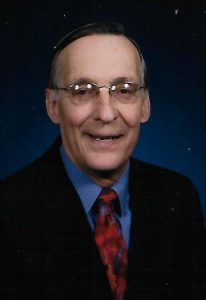
1938-2016
Retired Michigan Tech Professor Theodore “Ted” Grzelak of Dollar Bay passed away Sunday at St. Mary’s Hospital in Grand Rapids following a lengthy illness. He was 78.
He was born in Detroit and earned his bachelor’s of science in electrical engineering from the Michigan College of Mining and Technology in 1960. While at Tech, he was involved with Phi Kappa Tau fraternity. He received his master’s and PhD degrees from the University of Wisconsin-Madison.
He married the former Mildred Savalox in 1959 and in August the couple celebrated their 57th anniversary.
In 1965 he accepted a position with Cornell Aeronautical Laboratory near Buffalo, New York. According to his obituary, concern about heavy local pollution at the time convinced him to accept a position in the department of electrical and computer engineering at Michigan Tech.
He taught here from September of 1966 until his retirement in 2000. He was a coach for the Copper Country Junior Hockey Association, a member of the the Copper Country Ski Club and an official of the Central Division of the United States Ski Association. He was Dollar Bay’s Little League and Senior League baseball coach for several years.
He was an active member of Gloria Dei Lutheran Church in Hancock where he sang in the choir for nearly 40 years.
He is survived by his wife, Mildred, his three sons and eight grandchildren.
Funeral Services for Ted Grzelak will be held at 11 a.m. Friday (Nov. 18) at Gloria Dei in Hancock. Friends may call from 5 to 8 p.m. tomorrow at the Memorial Chapel Funeral Home in Hancock and Friday from 10 a.m. until the time of the service at the church.
A complete obituary can be found on the Memorial Chapel website.
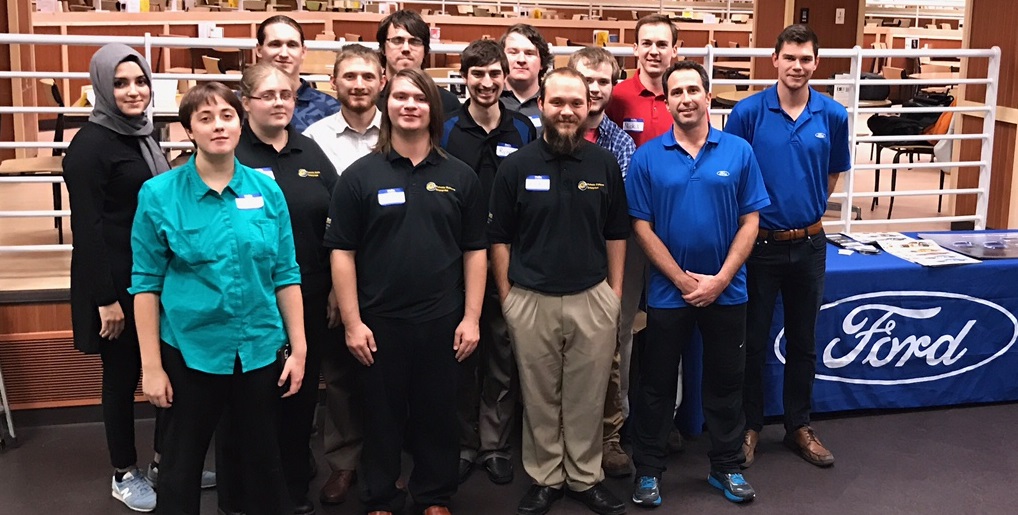 ECE’s Robotic Systems Enterprise (RSE) was host to the first annual Controlathon sponsored by Ford Motor Company on Saturday, November 12. Ten teams competed in the inaugural one-day event held on the Michigan Tech campus, Memorial Union Building.
ECE’s Robotic Systems Enterprise (RSE) was host to the first annual Controlathon sponsored by Ford Motor Company on Saturday, November 12. Ten teams competed in the inaugural one-day event held on the Michigan Tech campus, Memorial Union Building.
Ford’s purpose of the event was to raise the interest of controls engineers in the automotive industry. The students competed against each other as individuals or teams to see who could program an Arduino-based robot to complete pre-assigned tasks, such as solving a maze and following an object. The goal of the Controlathon was to create a unique solution to the presented problems in a limited amount of time. The teams were tasked to complete three separate events, scores were assigned for each event.
At the end of the day, Sirius Cybernetics came away with first place; 2nd Desert, 3rd 2CS & an EE, 4th C Dogs, and 5th place was Team Mine.
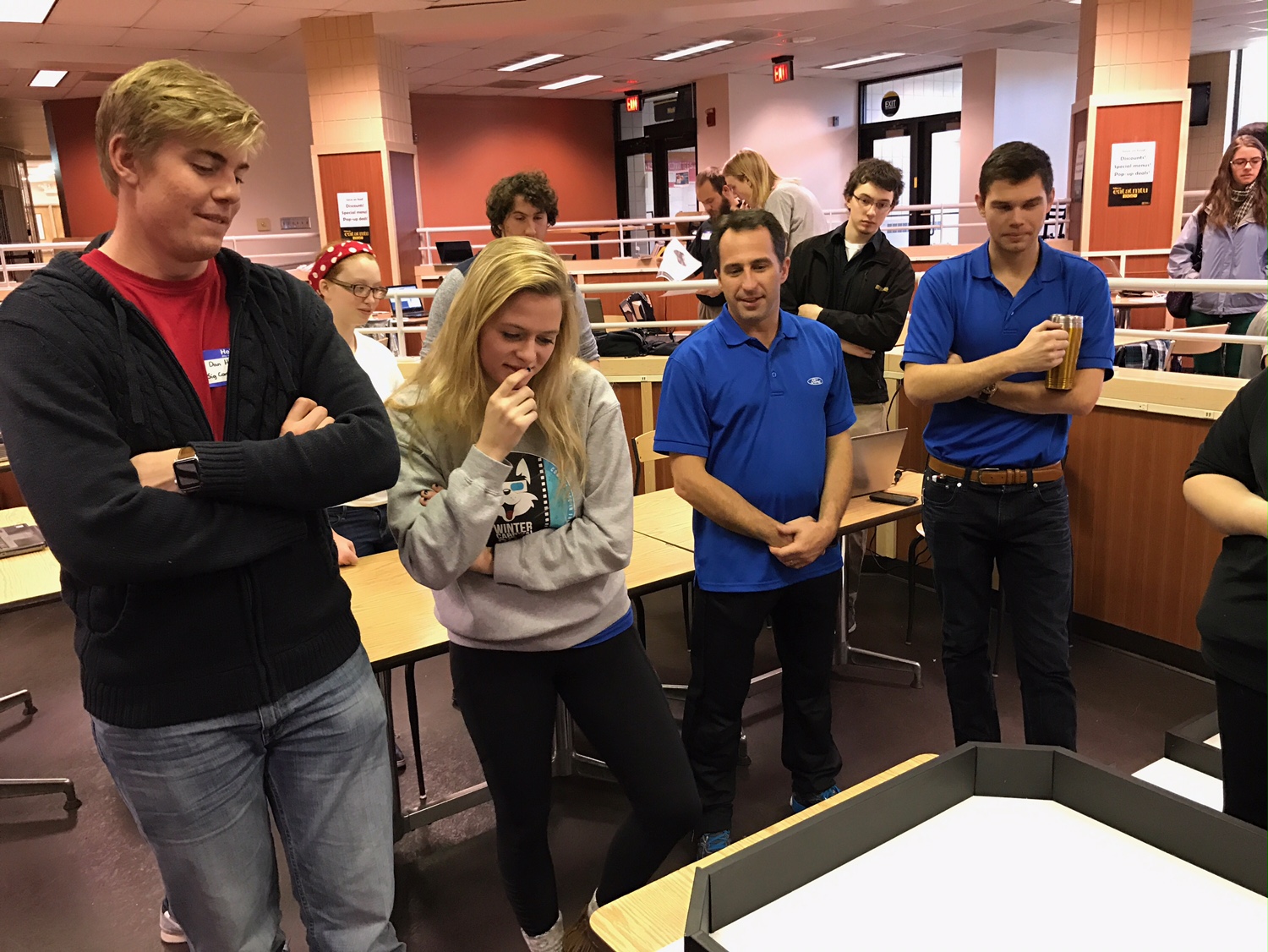
RSE is advised by Dr. Glen Archer.
Check out @mtuECE for more highlights from the event.
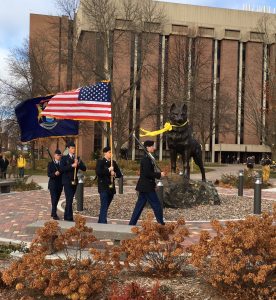 Today’s column is going to be a bit on the short side – not because I don’t have enough to write about, but rather because I may have too much, and it needs a little refining.
Today’s column is going to be a bit on the short side – not because I don’t have enough to write about, but rather because I may have too much, and it needs a little refining.
I don’t want to use this space to be too political, but I will say that I was deeply affected by the results of Tuesday’s election. This is not a comment on the policies or the suitability or my own thoughts about either of the candidates. Rather, the vote Tuesday has given me the uncomfortable opportunity to reflect about what it means for education in this country, and what my colleagues and I do for a living day in and day out. Here is the short version: as a nation we have now heard the collective voice of a large group of people that have been either forgotten or ignored by our system of higher education. We really ought to take a moment to think about what that says about our society and where it is headed.
My ideas on this topic are half-baked at best, in fact the oven is barely warm. So, I’ll leave it there and return to this topic at a future date.
Meanwhile, life at Michigan Tech continues churning along. We are well past the halfway point in the semester, moving quickly toward the Thanksgiving break, and then the December endgame that happens when we return from that.
Today is Veterans Day, and I do want to recognize those members of the ECE faculty and staff that have served in the U.S. Armed Forces. They are: Glen Archer, Mike Chase, Roger Kieckhafer, Chris Middlebrook, Mike Roggemann, and Mark Sloat. Gentlemen, thank you for your service.
It has been an unusually warm fall this year, and that is continuing right into November. Two years ago at this time there was already snow on the ground that would not disappear until April. This past Sunday the temperatures soared into the 70s, and while I was out riding my bicycle I saw someone water skiing on the Portage. We live in interesting times.
– Dan
Daniel R. Fuhrmann, Dave House Professor and Chair
Department of Electrical and Computer Engineering
Michigan Technological University